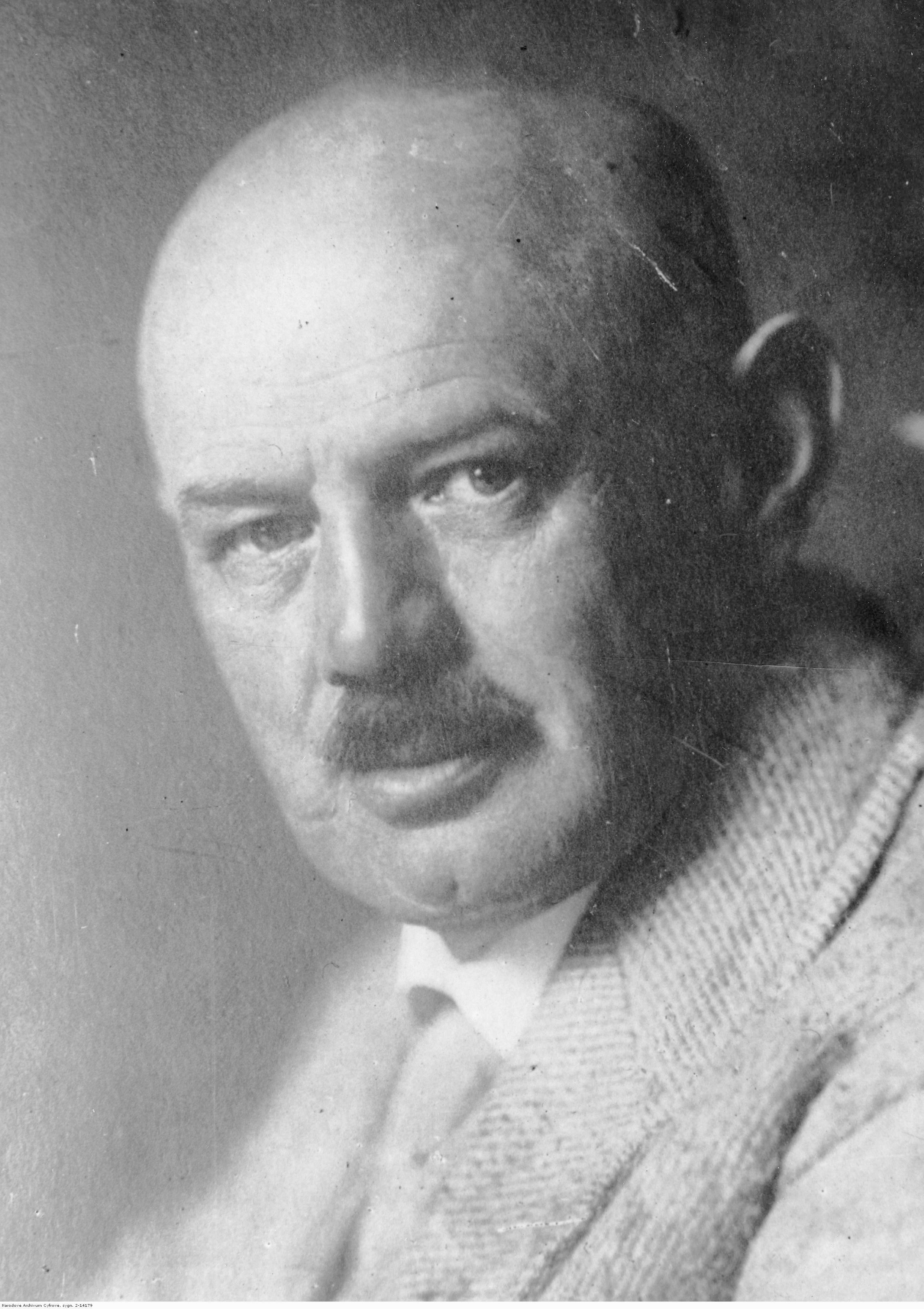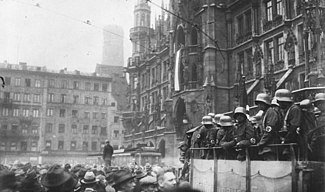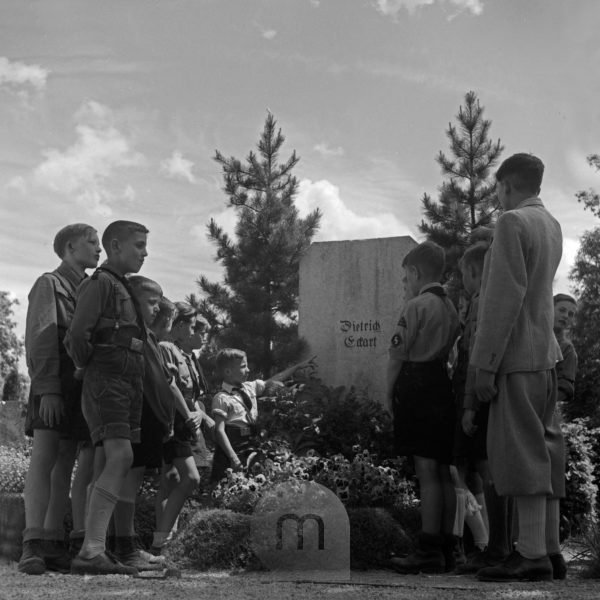Dietrich Eckart
Dietrich Eckart (23 March 1868 – 26 December 1923) was a German poet, playwright, journalist, publicist, and political activist who was one of the founders of the German Workers' Party, the precursor of the Nazi Party. Eckart was a key influence on Adolf Hitler in the early years of the Party, the original publisher of the party newspaper, the Völkischer Beobachter ("Völkisch Observer"), and the lyricist of the first party anthem, Sturmlied ("Storming Song"). He was a participant in the failed Beer Hall Putsch in 1923 and died on 26 December of that year, shortly after his release from Landsberg Prison, from a heart attack.
Eckart was elevated to the status of a major thinker upon the establishment of Nazi Germany in 1933, and was acknowledged by Hitler to be the spiritual co-founder of Nazism, and "a guiding light of the early National Socialist movement."
Eckart as a young man.
Eckart was born on 23 March 1868 in Neumarkt, 20 miles southeast of Nuremberg in the Kingdom of Bavaria, the son of Christian Eckart, a royal notary and lawyer, and his wife Anna, a devout Catholic. Eckart's mother died when he was ten years old and he was expelled from several schools. In 1895, his father died, leaving him a considerable amount of money that Eckart soon spent.
Eckart initially studied law at Erlangen, later medicine at the Ludwig Maximilian University of Munich, and was an eager member of the fencing and drinking Student Korps. He decided in 1891 to become a poet, playwright, and journalist. Diagnosed with morphine addiction and nearly stranded, he moved to Berlin in 1899. There he wrote a number of plays, often autobiographical, and became the protégé of Count Georg von Hülsen-Haeseler (1858–1922), the artistic director of the Prussian Royal Theatre. After a duel, Eckart was incarcerated at the Passau Oberhaus.[
As a playwright Eckart had success with his 1912 adaptation of Henrik Ibsen's Peer Gynt, which played for more than 600 performances in Berlin alone. Although Eckart never had another theatrical success like Peer Gynt, and blamed his numerous failures on the influence of Jews in German culture, that one play not only made him wealthy, it gave him the social contacts that he later used to introduce Hitler to dozens of important German citizens. These introductions proved to be pivotal in Hitler's rise to power. Later on, Eckart developed an ideology of a "genius superman", based on writings by the Völkisch author Jörg Lanz von Liebenfels and by philosopher Otto Weininger.
Eckart was instrumental in creating the persona of Adolf Hitler as one of the future dictator's most important early mentors, and was one of the first propagators of the "Hitler Myth". Their relationship was not simply a political one, as there was a strong emotional and intellectual bond between the two men, an almost symbiotic relationship. It was Eckart who gave to Hitler his philosophy of the necessity of overcoming "soulless Jewishness" as the basis for a true German revolution, unlike the false revolution of 1918. Although the need to present himself as a self-made man prevented him from publicly writing or speaking about the debt he owed to Eckart, in private Hitler acknowledged Eckart as having been his teacher and mentor, and the spiritual co-founder of Nazism.
The two first met when Hitler gave a speech before the DAP membership in the winter of 1919. Hitler immediately impressed Eckart, who said of him "I felt myself attracted by his whole way of being, and very soon I realized that he was exactly the right man for our young movement." It is probably Nazi legend that Eckart said about Hitler on their first meeting "That's Germany's next great man –one day the whole world will talk about him." Although not a member, Eckart was involved at the time with the Thule Society, a secretive group of occultists who believed in the coming of a "German Messiah" who would redeem Germany after its defeat in World War I. He began to see in Hitler the possibility that he was that person.
Eckart, who was 21 years older than Hitler, became the father-figure to a group of younger volkisch men, including Hitler and Hermann Esser, and acted as mediator between the two when they clashed, telling Esser that Hitler, whom he esteemed as the DAP's best speaker, was the far superior man. He became Hitler's mentor, exchanging ideas with him and helping to establish theories and beliefs of the Party. He lent Hitler books to read, gave him a trench coat to wear, and made corrections to Hitler's style of speaking and writing. Hitler was to say later "Stylistically I was still an infant." Eckart also schooled the provincial Hitler in proper manners, and regarded Hitler as his protégé
After living in Berlin for many years, Eckart moved to Munich in 1913, the same year that Hitler moved there from Vienna. In January 1919, he, Feder, Anton Drexler and Karl Harrer founded the Deutsche Arbeiterpartei (German Workers' Party, or DAP), which to increase its appeal to larger segments of the population, in February 1920 changed its name to the Nationalsozialistische Deutsche Arbeiterpartei (National Socialist German Workers Party, or NSDAP); more commonly known as the Nazi Party. Eckart was largely responsible for the party buying the Münchener Beobachter (newspaper) in December 1920, when he arranged for the loan which paid for it. The newspaper was renamed the Völkischer Beobachter and became the party's official organ, with Eckart as its first editor and publisher.[19] He also created the Nazi slogan Deutschland erwache ("Germany awake"), and wrote the lyrics for the anthem based on it, the Sturm-Lied.
On 9 November 1923, Eckart participated in the failed Beer Hall Putsch. He was arrested and placed in Landsberg Prison along with Hitler and other party officials, but was released shortly thereafter due to illness. He then went to Berchtesgaden to recuperate.
Eckart died in Berchtesgaden on 26 December 1923 of a heart attack. He was buried in Berchtesgaden's old cemetery, not far from the eventual graves of Nazi Party official Hans Lammers and his wife and daughter.
Although Hitler did not mention Eckart in the first volume of Mein Kampf, after Eckart's death he dedicated the second volume to him, writing that Eckart was "one of the best, who devoted his life to the awakening of our people, in his writings and his thoughts and finally in his deeds.” In private, he would admit Eckart's role as his mentor and teacher, and said of him in 1942: "We have all moved forward since then, that's why we don't see what [Eckart] used to be back then: a polar star. The writings of all others were filled with platitudes, but if he told you off: such wit! I was a mere infant then in terms of style." Hitler later told one of his secretaries that his friendship with Eckart was "one of the best things he experienced in the 1920s" and that he never again had a friend with whom he felt such "a harmony of thinking and feeling."
Hitler Youth paying respects at the grave
of Eckart, the Godfather or Nazism
Sturm - Lied
The lyrics for this Nazi song were written by National Socialist poet Dietrich Eckart, with the second stanza being written in 1919, the third in 1921 and the first in 1923. The stanzas were later rearranged into the now common order. The music was composed by Hans Gansser in 1921.
The phrase Deutschland erwache! ("Germany, awake!") was taken from this poem and came to be one of the most influential slogans of the NSDAP.
Storm! Storm! Storm! Storm! Storm! Storm!
Ring the bells from tower to tower!
Ring until sparks begin to fly,
Judas appears to win the Reich,
Ring until the ropes turn red from blood,
With only burning, torture and murder around,
Ring the storm until the earth rises,
Under the thunder of liberating vengeance!
Woe to the people that is still dreaming today!
Germany, awake! Awake!
Storm! Storm! Storm! Storm! Storm! Storm!
Ring the bells from tower to tower!
Ring the men, the old and the young,
Ring the sleepers out of their parlours,
Ring the girls down the stairs,
Ring the mothers away from the cradles!
The air shall clang and cannonade,
Rushing forth in the thunder of vengeance!
Ring the dead out of their grave!
Germany, awake! Awake!
Storm! Storm! Storm! Storm! Storm! Storm!
Ring the bells from tower to tower!
The serpent is let loose, the worm of hell!
Folly and lie has broken its chain,
Greed for gold in the hideous bed!
Bloody red the sky stands in flames,
Gruesomely the gables crash together,
Blow for blow on the chapel they crash!
Blustering the dragon smashes it to pieces!
Call the storm, now or never!
Germany, awake! Awake!
Watch a brief history of Eckart,
the German workers party and the Nazi Party
Born 23rd March 1868
Neumarkt, Kingdom of Bavaria
Died 26th December 1923 (aged 55)
Berchtesgaden, Bavaria, Weimar Germany





